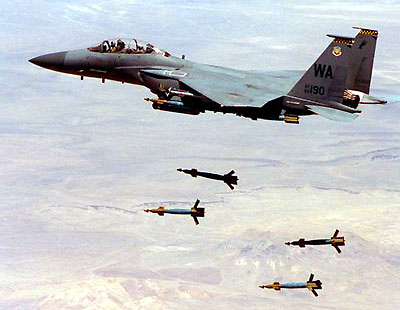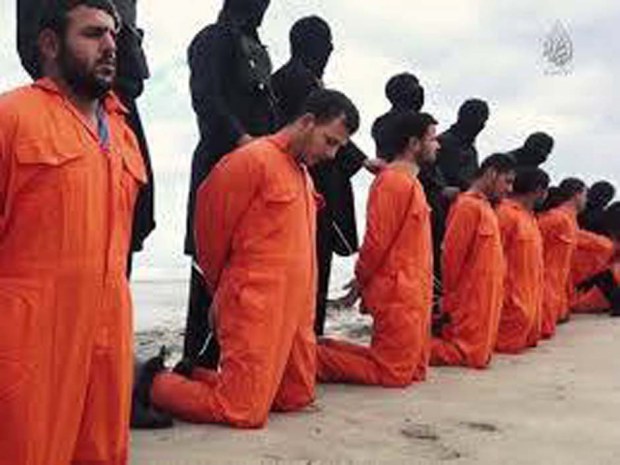‘What religion are you?’
Antonio Espares and his two co-workers had been abducted by masked men. His friends said that they were Muslims. Antonio could have done the same; he was a migrant worker from the Philippines, and he had registered himself as a Muslim, thinking it might make life easier in his new home. But when faced with death, he couldn’t deny his God.
‘I am a Christian,’ he said.
The two Muslims were allowed to go to a van, which drove away. Antonio’s captors cut off his lips, then forced him to kneel, and cut off the front of his thighs. Finally, they cut off his head.
The above story, taken from the website of Open Doors Ministries, is one among dozens of similar recent reports that illustrate the challenges Christians in Libya have been facing since the fall of President Gaddafi four years ago.
From the Frying Pan Into the Fire

In 2011, President Obama decided to use air strikes to support the ‘Arab Spring’ movement in Libya. Joined by various Western powers, including British air and naval forces, Obama succeeded in overthrowing the dictator Saif al-Islam Gaddafi, who was shot on 20th October, 2011. (At the time, I warned about the illegality of this war, and the dangerous political philosophy behind it.)
Instead of peace and democracy coming to Libya as hoped, the country began to be plagued by internal struggles, political corruption and civil unrest. Revolutionary groups that were united in overthrowing Gaddafi found themselves at loggerheads when it came to questions about running the country. Despite attempts from the new government to bring order and stability, the country has been the theater for a number of high profile attacks, massacres and hostage situations.
The Christians living in the country have become particularly vulnerable, as militant Islamist groups, including ISIS, have taken advantage of the instability and made Christians a target of attack. Because the Government’s official police and military are in shambles, they rely on private militias to serve as security forces. These militias are made up of extremists who have been systematically targeting the Christian populations, kidnapping and killing believers and burning churches.
Family members and relatives of kidnapped victims are often overwhelmed, yet usually demonstrate strong faith at the same time. A relative of a man named Naseem who went missing commented: “The feeling of depression and worry and sadness is indescribable. But if it’s God’s will for them to be martyrs for the name of Christ, like the apostles, and a witness to the kidnappers, we pray God will provide grace, peace and acceptance of His will.”
‘Even Worse Than During Gadhafi’s Time’
Libya’s population is 97% Sunni Muslim, and the Christian communities that do exist consist of Coptic Christians, Roman Catholics, Eastern Orthodox and Anglicans. This small Christian minority suffered under Gaddafi’s dictatorial rule, and many Christians hoped that conditions would improve with the new government. To their dismay, pressures against Christians increased after the country was liberated from Gaddafi. Now Christians find themselves squeezed between extreme Muslim groups, on the one hand, and criminal gangs on the other. Many of these gangs have not only been targeting Libya’s Christian minority, but going after believers from different African nations who routinely travel to Libya in the hope of finding work.
One common practice is for a militia to move into an area and ask everyone what their religion is. Those who say they are Christians are kidnapped and taken to face torture and death, while the Muslims are left in safety.
The extent of the problem revealed itself two years after the revolution when Hassan El Amin, chairman of Libya’s parliamentary human-rights committee, was forced to flee to London after death threats. ‘I have so many concerns about human rights violations in Libya,’ he commented, adding, ‘it is getting to a stage where it is even worse than during Gadhafi’s time’.
Libyan Terrorists Kill Coptic Workers
In late 2014, an ISIS militia group took over portions of the Eastern Libyan coastal city of Derna. By early 2015, ISIS forces controlled the entire city and began brutally enforcing Sharia law.
Once established in Derna, ISIS forces began kidnapping Coptic Christian migrant workers, who had travelled to Libya from Egypt to find work.
Coptic Christians belong to one of the oldest Christian traditions and comprise the majority of believers in the Middle East. Many Copts in Egypt had families to support and travelled to Libya as a last resort, hoping to find work in the oil fields or the construction sector.

A caption in the video called the captives the ‘people of the cross, followers of the hostile Egyptian Church.’ One of the killers, who was identified by his accent as being North-American, railed against ‘the cross delusion’ and pointed his knife towards Italy, declaring, ‘We will conquer Rome, by Allah’s permission.’
All but one of the victims were Egyptian. One of the men, Mathew Ayairga, was from Ghana or Chad (sources are unclear which) and had travelled to Libya to do construction work in Sirte. He was apparently travelling to Tripoli en-route back to Ghana when he found himself kidnapped along with the Christians. Ayairga was not a Christian himself at the time of his abduction. Impressed by the faith of the believers, when he was asked ‘Do you reject Christ?’, Ayairga reportedly responded by boldly declaring ‘Their God is my God.’
Before having their heads severed, the Christians in the video can be seen uttering the words, ‘O Lord Jesus Christ.’
Egypt retaliated with immediate air strikes against ISIS militants and weapons locations in Libya. David Cameron condemned the murders as ‘appalling’, ‘brutal’ and ‘senseless.’ However, the British Prime Minister went on to add that he did not regret helping to overthrow Gaddafi’s regime, despite the instability that has ensued as a result.
Libyan Terrorists Kill Ethiopians
On 19th April this year, Libyan terrorists released another video showing the execution of 28 more Christians, mostly Ethiopians and three from Eritrea. This video is divided into two parts, one which shows masked militants beheading 15 men on a beach on the shores of Barqa. It has another scene of 15 others being shot in the back of the head with rifles.
24 of the 29 minutes in this video are spent justifying the persecution of Christians and criticizing Christian doctrine, especially the doctrine of the Trinity. Numerous passages from the Koran and the Sunnah (the sayings and actions of Muhammad) are cited to substantiate that it is a ‘fundamental’ aspect of Islam to hate and persecute Christians. The Islamic scholar Al Islam Ibn-Taymiyyah is quoted as saying ‘Whoever does not consider the Jews and Christians to be disbelievers and does not hate them is not a Muslim.’
The video defended the slaughter by saying that these murders are justified if Christians refuse to convert to Islam or to pay the jizya (protection tax). At the end of the video, Islamic State cleric Abu Malik Anas An-Nashwan warns that ‘the Islamic State will spread, God willing. It will reach you even if you are in fortresses.’ An-Nashwan then gives Christians throughout the world three choices: (1) embrace Islam (2) pay the jizya tax (3) face ‘the edge of the sword’ for the men, and slavery for the women and children.
The demand that Christians pay the jizya tax is particularly harsh for Libyan migrant workers who have very little money. Writing in Frontpage Magazine, Raymond Ibrahim observed that
‘It is likely that the reason these Christians “resisted” to pay jizya was that they did not have the money—migrant Christian workers in Libya, whether from Egypt or Ethiopia, are about as poor as they get. And they refused the only other option that could have spared their lives according to Islamic law—renunciation of the Christian Trinity and conversion to Islam. The narrator continued by saying that IS had “invited” the Christians of Raqqa, Syria to enter Islam, but they refused.’
Prayer Points
- Pray that the police and military in Libya would achieve a measure of stability so that power does not rest with armed militias and extremists. However, a properly functioning government is likely to make the situation only marginally better for the Christians in Libya, since the government considers Christianity subversive. Libya does not recognize any religion other than Sunni Islam and forbids evangelism or the importation of Arabic Bibles into the country. As a security official told Reuters in 2013, ‘Proselytizing is forbidden in Libya. We are a 100 percent Muslim country and this kind of action affects our national security.’ Abdul Salam Bargathi, a Libyan defense official, suggested in 2013 that Christians could be considered a threat to national security. It is also illegal for a Muslim to convert to Christianity, although Christian migrant workers are officially allowed to have churches. Therefore, it is important to pray that lawmakers and officials in the government come to Christ.
- Also pray for non-Libyans from sub-Saharan Africa who have travelled to the country to find work. These workers are vulnerable to abuse, forced labor and detention, while Christian migrant workers face the added danger of being kidnapped and killed.
- Thank the Lord that the gospel has been reaching Libyans through satellite TV and the internet. Pray that this continues and that the Holy Spirit would direct these resources to the people whose hearts are ready to receive them.
- Thank the Lord for the perseverance of the Coptic martyrs, and pray that Christians throughout the world would be strengthened in their faith by these amazing examples.
- Pray that strength would be given to the family and relatives of those who were kidnapped and killed. As more Christians are taken, pray that they would be a witness to the attackers, and that Christians throughout Libya would be strengthened to face martyrdom if called upon to do so.
This article will be appearing in the monthly magazine of Christian Voice, a UK ministry whose website is http://www.christianvoice.org.uk/. The article is published here with permission of Christian Voice.
[facebook-comments-master-un]


